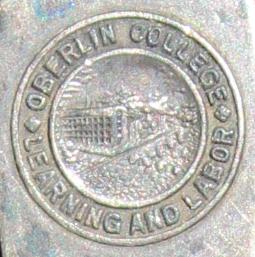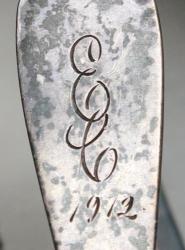N. E. Cornish Mustard Cup, Spoon, and Napkin Ring, 1890
Elizabeth Cornish Oberlin College Spoon, 1912
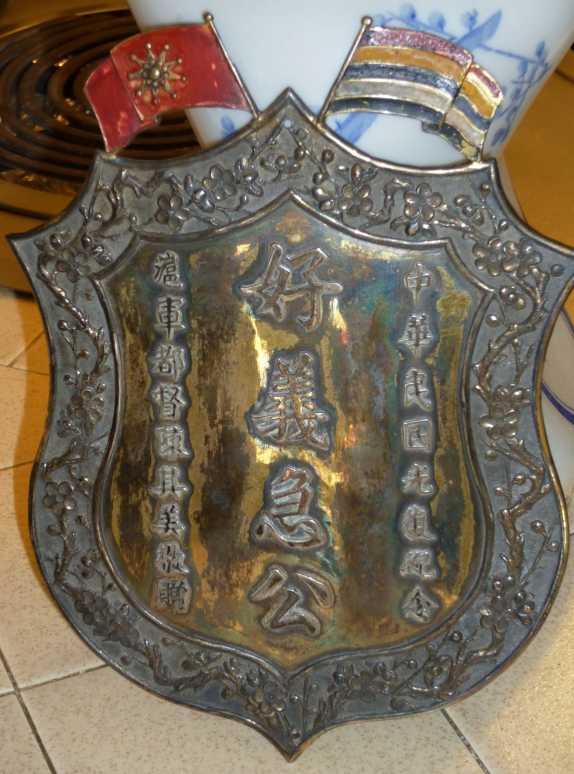
|
||
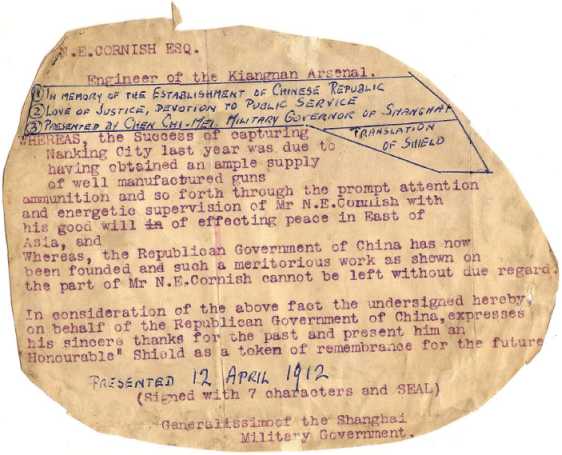 Shield photographs courtesy of Simon Faithfull A Function in the Kiangnan Arsenal, by V. P. Suvoong (Shu Feng), The Republican Advocate (of China), March 30, 1912. The author writes about an event honoring his friend and colleague, N. E. Cornish. Excerpt from article: The story of the Revolution is yet fresh in the memory of the reader, but there were many under-currents of force gathering to make the stream that were not apparent on the surface, and we will only mention two which may escape the notice of the future historian. These two factors are Mr. Chen Chi Mei and Mr. N. E. Cornish. Mr. Chen has been and is the military governor of Shanghai and its vicinity which embraces a wide area. Because he is a public man in a critical period, he has been well belied, but he was too busy to reply to the slanders levelled at him either by jealousy or political hatred. One of the greatest things he did for the speedy conclusion of the civil war was to cause telegrams to be sent to the northern Generals to combine and protest that they should not slaughter their own countrymen any longer just to support the Manchu dynasty. They became persuaded and did as Mr. Chen suggested. War was practically stopped at that very moment. This was a feat worthy of Mr. Chen's diplomacy; at any rate, its result was an incalculable saving in blood and treasure. If Mr. Chen had faults before. they should be forgiven. but he had no faults that could be pressed home. Powerful as he is, yet he is as poor as Aristides and as just too. It is a healthy sign for China that we can boast of such men as Sun Yat-sen and Chen Chi-mei being in our midst. As to Mr. Chen's keen sense of justice we take pleasure in recording his presentation of a gold shield to Mr. Cornish in acknowledgment of distinguished service in the cause of China. Mr. Cornish is the second factor mentioned above as being instrumental to the speedy termination of the late war in China. These two men are antipodes to each other in their place of nativity, but their actions converged toward the same centre of peace. War! war! was apparently their cry, but their combined efforts brought peace ! After having been in the service of the Kiangnan Arsenal twenty-six years, Mr. Cornish. of course, has a large circle of acquaintance in Shanghai and is well known in the East generally; but he is a modest and retiring man and so his name is not so often in print as that of more pushing late-comers who may rejoice to send home glowing accounts of themselves and their deeds. That is, Mr. Cornish minds his own business and endeavours to bring it up to perfection, to be on the level with his profession in the world. He has so far succeeded in his line that he has added many improvements in the mechanisms of the gun and carriage that were for a time peculiar in those weapons of the Kiangnan Arsenal only. For instance. it was he who invented the peculiar one-motion by which the breech block of a breech-loader can he easily opened or closed, whereas, otherwise these actions required generally three motions. An artillerist in the thick of battle no doubt appreciates this simple improvement. Simple of course after the invention, like the story of Columbus’ egg! During the Revolution Mr. Cornish occupied a delicate position. Being a neutral, he was informed by a general notice from his Consul that he was not to commit an over act. So, while he did not actually take part in the field, as some other nationals did in behalf of the northern army, he nevertheless heartily sympathized with the Arsenal people in their duty in those stirring months. So, when the southern raw recruits could not make any headway against Chang Hsiin's veterans and larger guns, he was requested to make suitable carriages for the 40 pounder guns in the stores here, in order to be easily transported from place to place to make fitting replies to the Imperialists in Nanking. Accordingly he set his men to work and in a short time the Arsenal garrison gunners were in Nanking using these weapons of precision with effect, so much so, that wherever these guns were brought to bear, the salute was too hot for the imperialists who became aware that the game was up in Xanking at least. They immediately capitulated and went across the Yangtze to Pukow. This was the beginning of the end of the war. A short time ago, a meeting of Mr. Cornish and Mr. Chen was arranged, not indeed.,for the purpose of claiming merit on the part of Mr. Cornish, who nevertheless would like to see the man on public business matter in connection with his own department. Then it was that Mr. Chen was reminded that he had a pleasurable duty to perform -- To render honour to whom honour is due. The ceremony of presentation took place in the Arsenal on April 7th last which was a Sunday, in the compound known here as the Tating or Yameu which was suitably and tastefully decorated for the occasion. The inner court area with its elevated skylight, carpeted flooring, and the ever recurring bamboo trimmings around the galleries, besides a profusion of flowers and plants, furnished a fine extemporaneous Dining Hall. There were six tables laid out, one long and five round ones, for Mr. Cornish seemed determined to take this opportunity to make his friends both foreign and native feel that this was a rare occasion on which the young Republic and it foreign well wishers might make mutual felicitations without prejudice to any one with the exception of the Manchus, who fortunately were too far away. A large number of Mr. Cornish’s foreign friends came from Shanghai to congratulate him, among whom were quite a number of ladies to whom an entertainment here must he rather novel and unique; as this Hall ever since its foundation nearly fifty years ago had never been so honoured and graced before by the presence of so large a company of beauty and wit from the great West. The Chinese guests present were principally the officers of the Arsenal and the four deputies sent by Hr. Chen to make the presentation. Mr. Li Ping-shu, being the Director was present and so were the young ladies of his family and his grandchildren. The interpreter Mr. Chi and his daughters were also present. Mr. Cornish justly remarked at the time that this was the first time that he ever met Chinese ladies participating in a public function as this, showing the new order of things is already acting like a leaven among the customs and manners of the people. In the matter of fashion in dress these young ladies were also apparently and asserting their undoubted rights as might be seen in their ever varying styles of clothes and head gears, which are distinctly different from those of the last dynasty. On this occasion the foreign ladies with a generosity inborn of a superior education tried to be friendly and social to the Chinese sisters who profusely smiled and timidly said a "yes" or “thank you" in English in reply, adding in their heart, no doubt, "I wish you could speak Chinese"! 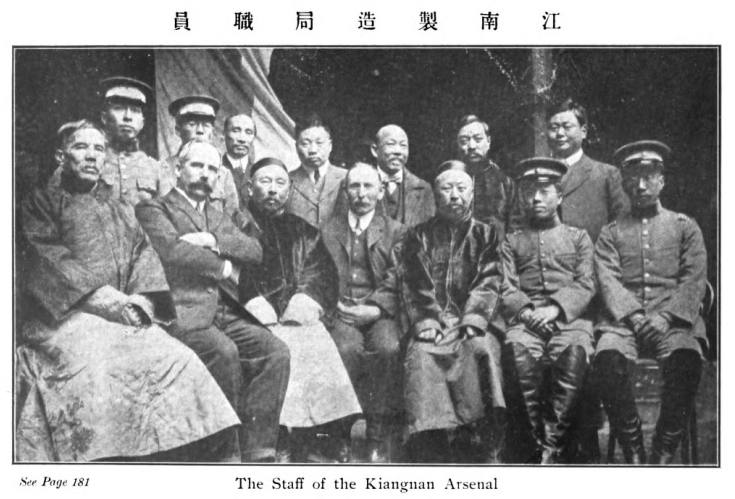 The reception Hall is just fronting on the improvised Dining Hall. Its entrance was adorned with a large British flag on the right, side draping from the top to the floor and the live coloured flag of the Republic on the left. The carpeted Hall inside was gay with red satin and gold thread embroidery with elegant vases of flowers in profusion. The company was in the best humour to be pleased and to please; and conversation was lively in different groups when the gold Shield arrived. This is a gold tablet about 6 inches long, by 4 inches wide, set in an embossed thick silk base in a picture frame. On the Tablet are four Chinese characters [see photo] which freely translated, signify:—“Partial to Righteousness and anxious for the public weal,” thereby testifying to the character and action of the recipient. On the left side of the Tablet is an inscription in Chinese describing the recipient's distinguished services and the Republic's appreciation of the same. On the right side is a translation of the same in English. All the Chinese characters were written by Mr. Chen himself, who besides being clever and able in other capacities is a fine Chinese scholar and calligraphist. The latter attainment is always highly prized among the Chinese. This Shield or Tablet is very valuable on many accounts, and not is doubt its recipient will ever regard it with satisfaction. Mr. Chen deputed four of his stall oflicers to make the presentation for him and they did it with a befitting speech. As we gathered round to scrutinize and admire the Shield, we could observe that our fortunate friend was greatly touched Mr. Cornish, eyes sparkled with evident and his whole frame seemed to quiver a little with the sense of duty well done and appreciated. To him was it not a moment of supreme happiness? After over a quarter of a century's labour his service was at last honoured by one of the most distinguished representative of the first Republic of all the East. Like a victor in the Olympic Game after a long and arduous struggle he proudly stood, crowned with the much-coveted laurels and approbation of his fellow men. This presentation shows to the world that China delights to honour her benefactors who give up home and its dear associations to do her a service. In a word, China is grateful. After the whole company had comfortably sat down at the different tables, to discuss the generous menu provided by one of the first caterers in Shanghai, Li Ping Shu got up to propose to the toast of Mr. Cornish in a few chosen eloquent words recounting how the gun department had been flourishing under his charge and that it was by firing those new weapons fifty-one times in Nanking that the city had to capitulate at discretion, which practically brought the war to a speedy close. That toast was drunk with enthusiasm by all present accompanied by three cheers and a rousing Tiger. Mr. Cornish replied with his usual modesty, ending with a toast to Mr. Li, whose career in the Arsenal was well known to all those present and whose service during the troublous period of the Revolution proved him to be a man of great administrative ability as well as popularity in Shanghai, the most important halting place for the contingent troops that came from the different southern provinces destined for the seat of war. Different other toasts were also proposed, which were washed down with the best vintage of France and a vast deal of good humour. 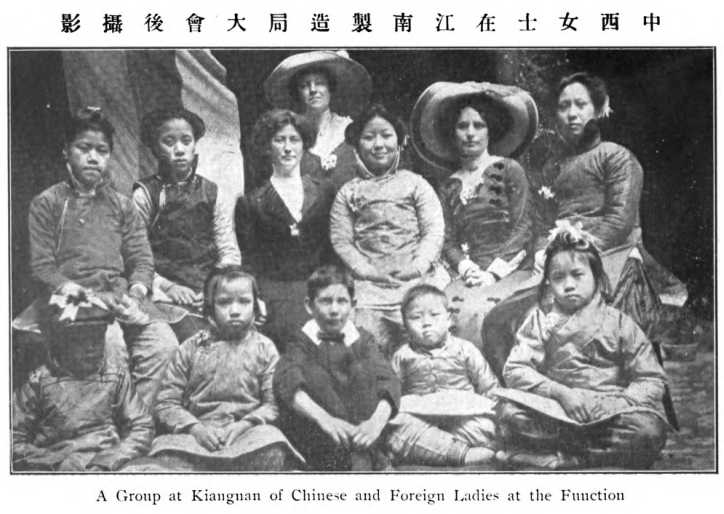 The last but the most grateful toast was to the ladies present, coupled with the name of Miss Goddard, a niece of Mr. Cornish, who was really the hostess of the festivity, as it was through her assiduous and tasteful attention that the Hall was decorated with befitting beauty and enchantment. The company honoured this toast with alacrity and high spirits; for whose soul is not stirred at the mention of ladies? There was a moment of hesitation, and then the company roared out singing: For She is a jolly good fellow" etc! Three cheers and a Tiger followed. Ah, if we had Robert Burns with us, he might give us a more aesthetic song to honour that gentler sex with. By that time the glasses had been charged again and again, so criticism was out of place, and indeed I do not remember distinctly what Mr. Cornish said in his reply for his niece's toast! Then the company rose and after a few more mutual felicitations, they separated, well pleased with a function that will, no doubt, be long remembered in connection with the latest Republic in the world, in which an Englishman had quietly acted an important part. V. P. Suvoong, The Republican Advocate (of China), March 30, 1912. Webmaster's Note The "Miss Goddard" mentioned in the last paragraph was probably Nelly Goddard. N. E.'s sister, Annie Cornish Goddard (born 1863), had two daughters, Nelly (1886) and Violet (1894). When the photo was taken in 1912, Nelly was 26 and Violet was 18. |
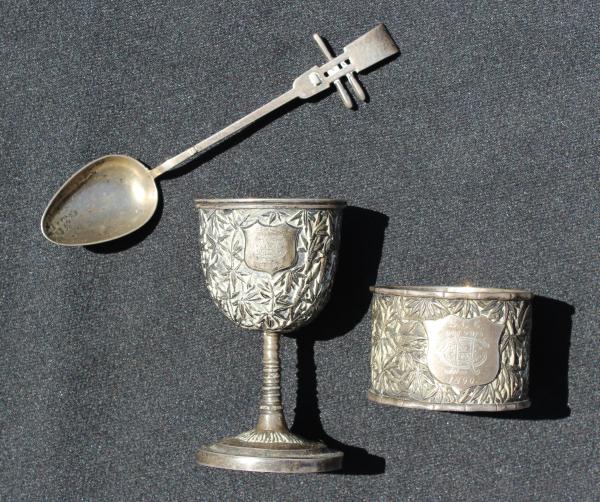
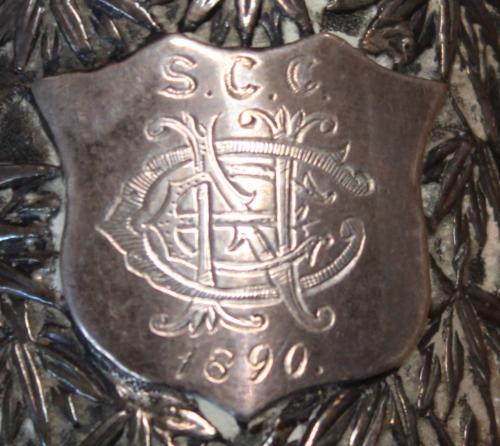 This
is a mustard cup, spoon, and napkin ring set that belonged to my
great-grandfather, Nicholas Edward Cornish. To the left, you can see a
close-up view of the logo on the napkin ring. The initials S. C. C.
stand for Shanghai Cricket Club, and the year is 1890. The rather
elaborate symbol in the middle are the initials N E C superimposed over
each other. The spoon resembles a musical instrument (Chinese er-hu
violin?) What you see here is one-half of a paired set given to my
family by my
third cousin, Alison Bailey, who still has the other half of the set.
This
is a mustard cup, spoon, and napkin ring set that belonged to my
great-grandfather, Nicholas Edward Cornish. To the left, you can see a
close-up view of the logo on the napkin ring. The initials S. C. C.
stand for Shanghai Cricket Club, and the year is 1890. The rather
elaborate symbol in the middle are the initials N E C superimposed over
each other. The spoon resembles a musical instrument (Chinese er-hu
violin?) What you see here is one-half of a paired set given to my
family by my
third cousin, Alison Bailey, who still has the other half of the set. 
